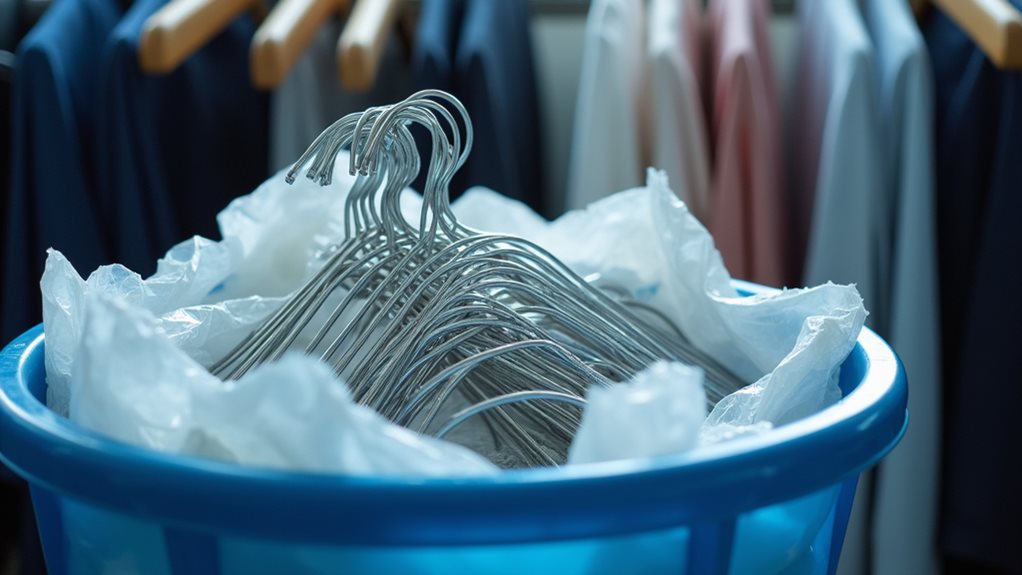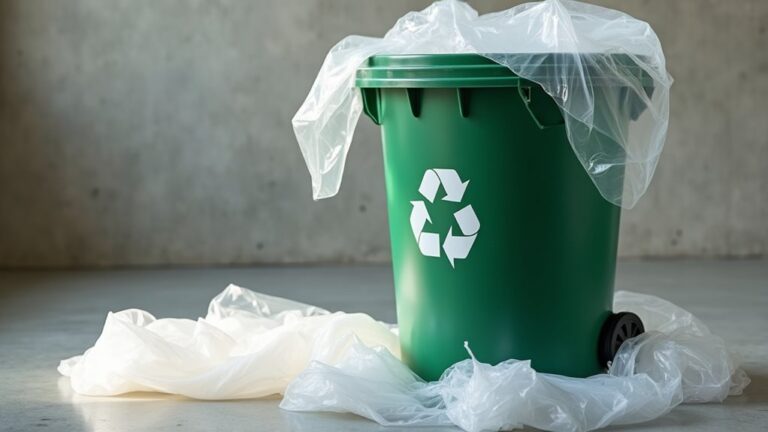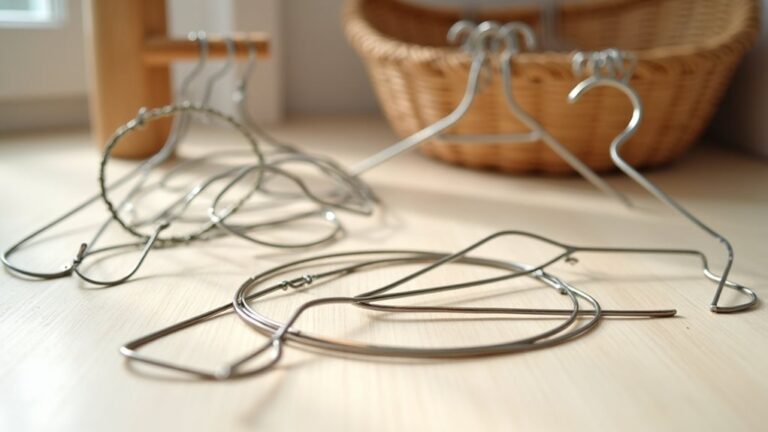You can’t toss those wire hangers from your dry cleaner into your curbside recycling bin because they jam sorting machinery and cause costly equipment damage, but they’re definitely not trash either. Most dry cleaners happily accept returned hangers for reuse – just call ahead to confirm their policy and look for designated drop-off baskets. If you’re feeling crafty, wire hangers transform beautifully into jewelry organizers, plant supports, or picture frame stands. Keep exploring to discover even more sustainable solutions.
Understanding Wire and Plastic Hanger Materials
The humble hanger sitting in your closet might seem like a simple piece of plastic or wire, but understanding what it’s actually made of can save you from making recycling mistakes that I’ve definitely made before 😅.
That innocent-looking closet hanger is trickier to recycle than you think—trust me, I’ve learned this lesson the hard way.
Wire hangers from dry cleaners are typically crafted from steel or aluminum, which makes them theoretically recyclable, though you can’t just toss them in your curbside bin.
Plastic hangers present a trickier challenge since many combine multiple materials—you’ll often find metal hooks attached to plastic bodies, creating a recycling nightmare.
When I started paying attention to these details, I realized that proper hangers disposal begins with identifying whether you’re dealing with pure materials or those frustrating mixed-material combinations that contaminate recycling streams.
Similar to how plastic bags from dry cleaning pose challenges for standard recycling programs, hangers require alternative disposal methods to ensure they don’t end up in landfills.
Why Dry Cleaning Hangers Cannot Go in Recycling Bins
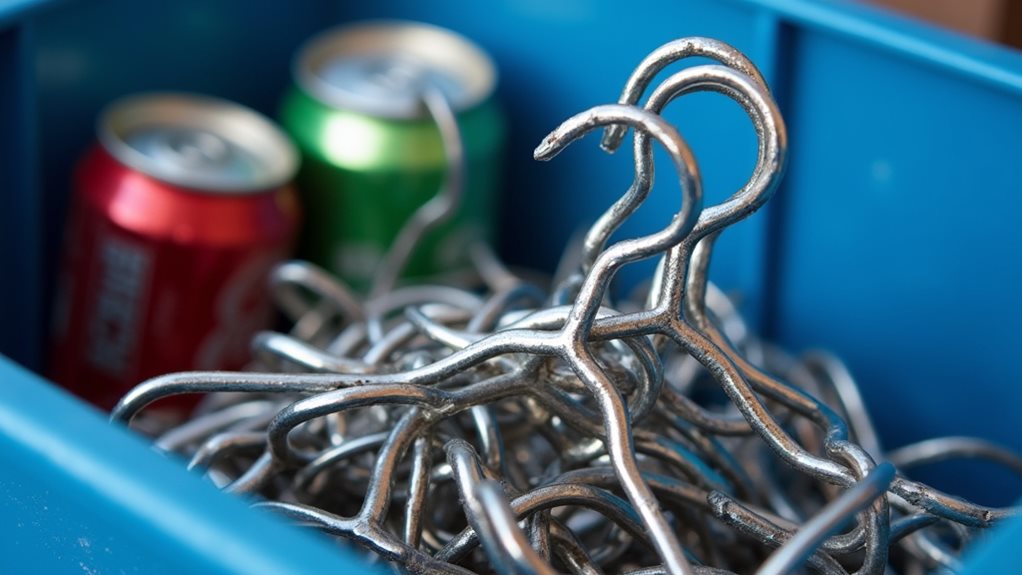
You might think tossing those wire hangers into your recycling bin is doing Mother Earth a favor, but unfortunately, they’re actually causing chaos behind the scenes at recycling facilities.
These seemingly innocent hangers jam up the expensive sorting machinery, forcing workers to shut down operations and manually untangle the mess—kind of like when your earbuds turn into a knot overnight, except it costs thousands of dollars to fix.
Beyond the equipment damage, hangers contaminate the recycling stream because they’re made from mixed materials that can’t be processed with your typical bottles and cans, ultimately making the entire batch less valuable or even unusable.
Equipment Jams and Damage
Although I once confidently tossed my dry cleaner’s wire hangers into my recycling bin, thinking I was being environmentally responsible, I learned the hard way that these seemingly innocent items can wreak absolute havoc on recycling equipment.
When wire and plastic hangers enter the sorting machinery at recycling centers, they don’t just disappear quietly – they twist, tangle, and jam the automated systems, causing expensive breakdowns that can shut down operations for hours.
Picture massive conveyor belts grinding to a halt because one rogue hanger decided to wrap itself around vital mechanical parts 😅.
These equipment jams create costly delays, damage sensitive sorting machinery, and force workers to manually extract stubborn hangers from complex mechanical systems, ultimately making recycling less efficient for everyone.
Material Processing Limitations
Beyond the mechanical mayhem that hangers create, recycling facilities face a fundamental challenge with these items: they simply don’t fit into any of the material categories that municipal recycling programs are designed to handle.
Think about your typical recycling day—you’re sorting bottles, cans, paper, and cardboard into neat categories, but where exactly do metal hangers belong? They’re neither pure metal like aluminum cans nor clean plastic like bottles.
Wire hangers often come mixed with those crinkly dry cleaning bags, creating a confusing hybrid that confounds sorting systems. Even when you separate them carefully, their awkward shape and mixed materials make them processing nightmares, contaminating entire batches of otherwise recyclable materials and disrupting the facility’s carefully orchestrated workflow.
Contamination of Recycling Streams
When I first started recycling religiously in college, I’d toss everything that looked remotely recyclable into that blue bin with the confidence of someone who thought good intentions were enough—wire hangers included.
Turns out, contamination from non-recyclable items like those hangers creates a domino effect that messes up entire batches of otherwise perfectly good recyclables.
When you recycle wire hangers in your curbside bin, they tangle around sorting equipment, causing expensive breakdowns and forcing workers to stop production to untangle the mess.
This contamination increases processing costs and reduces the overall effectiveness of recycling programs in your community.
Your well-meaning hanger disposal actually undermines the very system you’re trying to support! 😅
Similar to dry cleaning bags, these items pose the same jamming risk to sorting machinery due to their problematic shapes and materials that aren’t designed for standard recycling equipment.
Returning Hangers to Your Dry Cleaner for Reuse
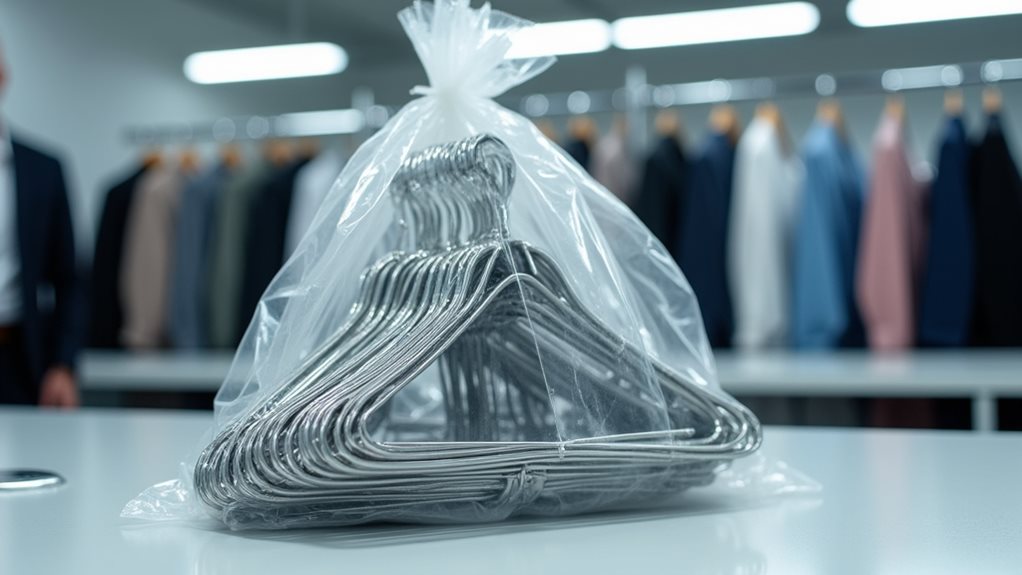
You’ll be pleasantly surprised to discover that most dry cleaners actually welcome your wire hangers back with open arms, creating a simple win-win situation that I’ve personally used for years.
When you return those hangers instead of tossing them in the trash, you’re not merely reducing waste but also helping your dry cleaner cut costs, which honestly makes me feel like I’m doing my small part for the planet 🌍.
The process couldn’t be easier—just bring your clean hangers along during your next drop-off, and you’ll quickly learn that this small gesture creates ripple effects of environmental benefits that extend far beyond your closet.
Similarly, you can ask your dry cleaner if they accept returned plastic garment bags for reuse, further reducing waste from your dry cleaning routine.
Dry Cleaner Acceptance Policies
Most dry cleaners welcome those wire hangers back with open arms, treating them like boomerang gifts that keep their business running efficiently while helping you clear out that growing collection from your closet.
However, you’ll want to call ahead because acceptance policies vary greatly between locations, and some establishments have specific guidelines about which hangers they’ll take back.
Many dry cleaners gladly accept used wire hangers regardless of where you originally got them, while others prefer only their own branded versions.
Some locations have designated drop-off bins near their entrance, making returns remarkably convenient during your next visit.
Before hauling in that overflowing bag of hangers, a quick phone call can save you from an awkward conversation at the counter.
If you’re staying at upscale hotels that offer dry cleaning services, these properties often handle the hanger lifecycle internally, returning garments on their own hangers that guests can leave behind for the hotel’s reuse program.
Environmental Benefits of Reuse
While we often focus on the convenience of returning those wire hangers, the environmental impact of this simple act creates ripple effects that extend far beyond your closet’s organizational needs.
When you bring hangers back to your local dry cleaner, you’re actively combating the 70 pounds of textile waste the average American discards annually – and honestly, that number surprised me too! 😅
This simple reuse practice prevents equipment jams at recycling plants, where those pesky wire hangers can wreak havoc on machinery.
You’re also supporting a circular economy that reduces manufacturing demands, while encouraging your local dry cleaner to maintain eco-friendly practices.
It’s remarkable how one small habit can create such meaningful environmental change.
If returning hangers isn’t possible, consider exploring upcycling projects that transform these wire accessories into useful household items, garden supports, or craft supplies.
Hanger Return Process
Walking into your dry cleaner with a bundle of wire hangers might feel awkward at first, but I promise you’ll discover that most establishments not only welcome these returns, they genuinely appreciate your thoughtfulness.
I used to sheepishly clutch my hangers like I was returning borrowed homework, until my cleaner smiled and pointed to a designated basket right by the counter 😊.
Before making your first trip, simply call ahead to confirm their specific policies, since some shops have particular drop-off areas or preferred times for returns.
This small gesture helps them reuse hangers multiple times, supporting their business while keeping those metal frames out of landfills, creating a win-win situation that honestly makes you feel pretty good about your environmental impact.
Many dry cleaners actually prefer this approach over standard recycling because these hangers can jam sorting machinery at traditional recycling facilities.
Creative DIY Projects Using Wire Hangers
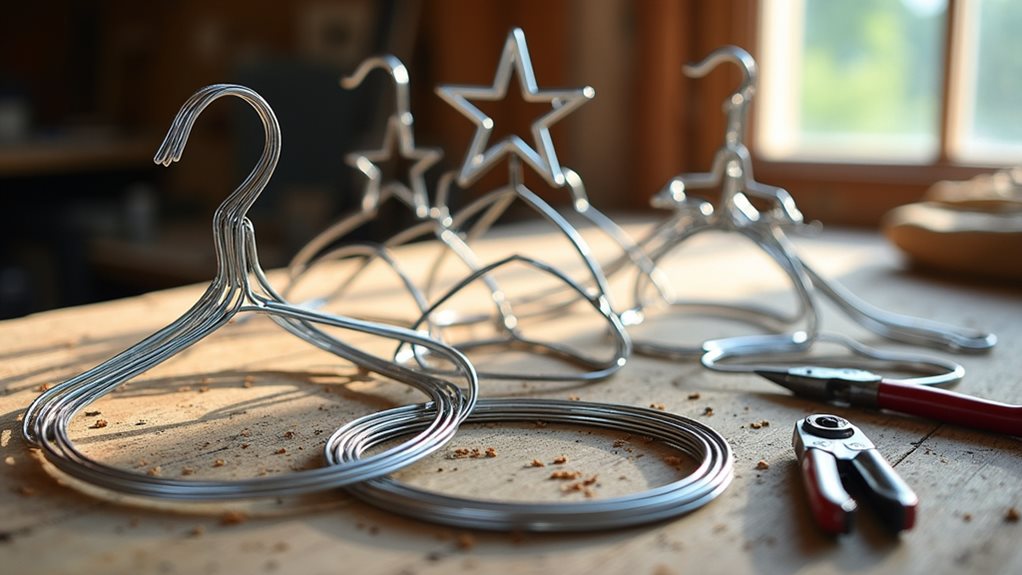
Before you toss those wire hangers into the donation pile or recycling bin, consider the incredible transformation potential hiding in their simple, bendable frames.
These metal marvels become surprisingly versatile tools with just a few creative twists and bends. Transform them into spiral jewelry organizers that’ll make your tangled necklace drawer finally behave—trust me, I’ve been there with the frustrating morning untangling sessions! 😅
Straighten and reshape them into charming picture frame stands for your desk, or create U-shaped plant supports that’ll help your garden babies grow strong.
You can even fashion wall-mounted coat racks or combine multiple hangers into vertical shoe storage solutions.
It’s amazing how something so ordinary becomes extraordinary with a little imagination and elbow grease.
Household Uses for Repurposing Dry Cleaning Hangers
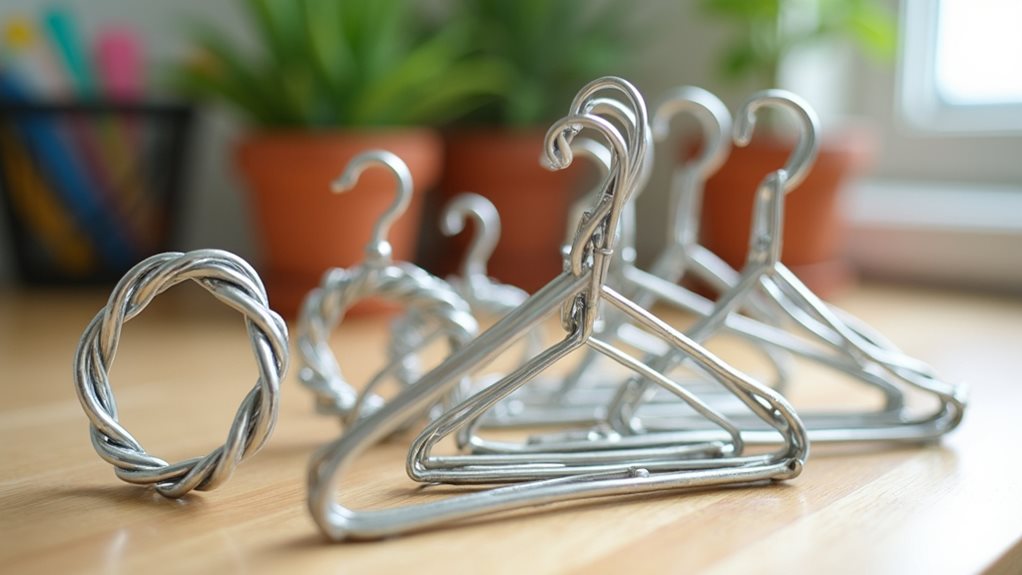
Beyond these artistic transformations, wire hangers become surprisingly practical household heroes when you start looking at your daily organizational challenges with fresh eyes.
Instead of tossing them into curbside recycling bins, you’ll discover they’re perfect for creating custom jewelry organizers by spiraling the wire to hold tangled necklaces and bracelets.
I’ve straightened countless hangers to fashion picture frame stands that cost nothing but five minutes of gentle bending.
Your houseplants will thank you when you craft U-shaped supports from these discarded treasures, and your entryway becomes infinitely more functional with a DIY coat rack.
Multiple hangers connected together solve shoe storage nightmares, proving that hangers and reuse go hand-in-hand for clever homeowners.
Special Recycling Programs and Alternative Options
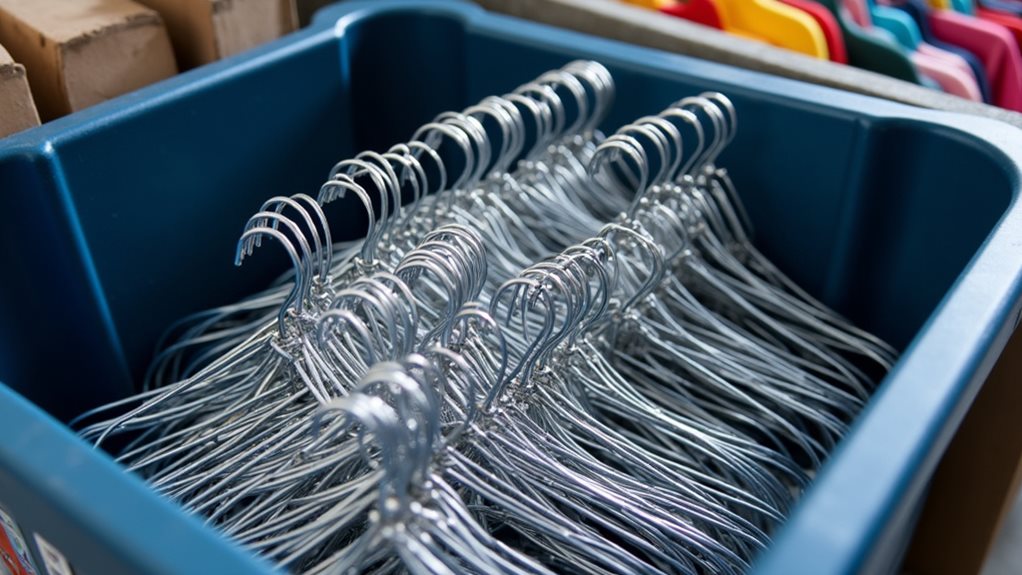
While curbside recycling bins might reject your wire hangers faster than a bad first date, several specialized programs have emerged to give these metal companions a proper second chance at life.
Your local dry cleaner often welcomes these wire hangers back with open arms, creating a beautiful circle of reuse that’d make any environmentalist tear up slightly. The Drycleaning & Laundry Institute has championed industry-wide recycling programs, proving that even small businesses can make massive environmental impacts when they band together.
Don’t overlook scrap metal recyclers either – they’ll often accept wire hangers, though you’ll want to call ahead since requirements vary.
These recycling programs transform potential waste into valuable resources, supporting local businesses while reducing new hanger production. Major retailers like Amazon and Walmart also increasingly support eco-friendly laundry solutions and may participate in take-back programs for various household items.
Eco-Friendly Dry Cleaning Practices and Sustainability
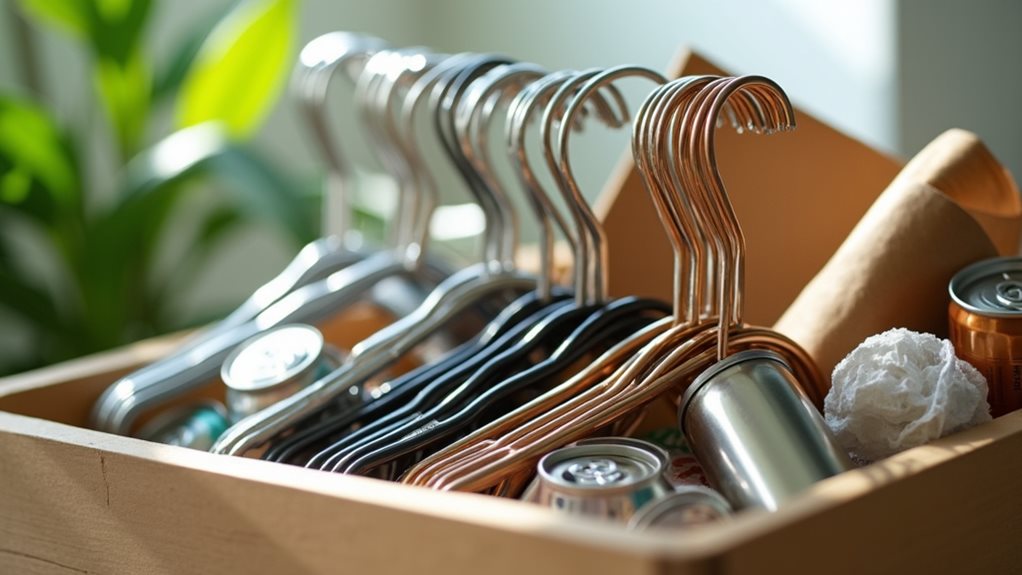
As environmental consciousness reshapes how we approach everyday services, progressive dry cleaners have discovered that sustainable practices aren’t just good for the planet—they’re actually better for your clothes, your health, and surprisingly, your wallet too.
You’ll find these innovative cleaners using perchloroethylene-free solutions that eliminate those harsh chemical odors while protecting your garments more gently.
Look for businesses displaying the recycling symbol prominently, as they’re often the ones implementing extensive sustainability programs. Many eco-friendly cleaners now accept wire hangers for reuse, transforming what was once waste into valuable resources through distillation recycling processes.
Spot the recycling symbol at your dry cleaner—it signals comprehensive sustainability programs that turn everyday waste into valuable resources.
Their advanced equipment delivers superior garment care while minimizing environmental impact, proving that choosing green doesn’t mean compromising quality—it actually improves your entire dry cleaning experience. Professional wet cleaning systems represent another sustainable option that uses specialized detergents and controlled moisture to achieve excellent results without traditional solvents.

